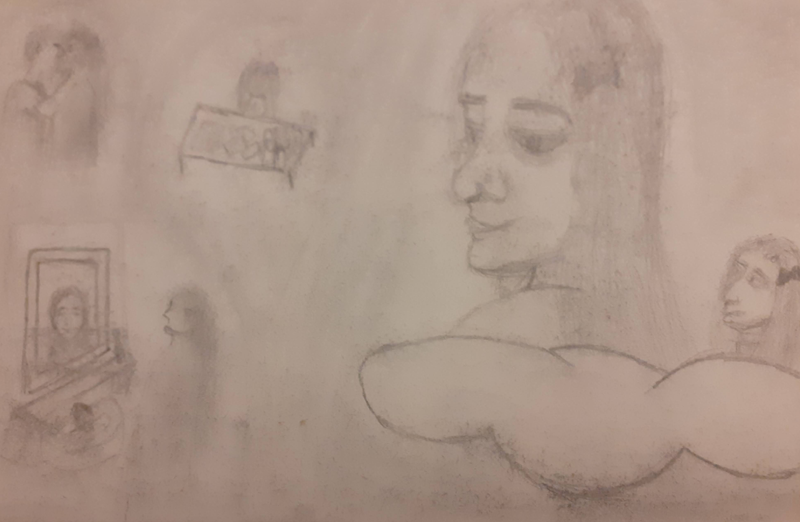Posted June 26th 2021
This article makes a brief reference to sexual trauma.
Complex PTSD. Yeesh… As if PTSD didn’t sound dramatic enough!
“What even is it?” I asked myself, as the lovely mental health triage nurse explained when he couldn’t help me because my case was (you guessed it) complex.
“That’s absolutely fine, I understand,” I said. “Thanks for all your help anyway.”
Honestly speaking, I was too heartbroken to research what Complex PTSD was. I stumbled along believing I was just a complex case with complex needs that required solutions too complex to fathom. In other words, I thought I was a lost cause.

Months later, I finally sat opposite a qualified counsellor to escape my crushing depression. I realised then just how much trauma had seeped into my life.
I was 16 when I was first diagnosed with PTSD due to previous sexual trauma. It came out in a very ugly way.
I had constant flashbacks during the day and horrible nightmares.
I was lucky enough to receive help and fully heal, but unfortunately, I had been re-traumatised years later and was diagnosed with complex PTSD. All my hard work was undone.
My experience this time around wasn’t as much of an anxiety-filled minefield as the first time. It was more subdued with hollow emptiness and feelings of worthlessness. I thought that meant it wasn’t as bad as before since I could ‘fake’ my way through life.
What I hadn’t anticipated, however, was how silent the enemy was. My trauma was being fed to me like a slow poison.
For breakfast, I’d drown in a bowl of low self-esteem. “You’re so worthless, you don’t even deserve food”. For lunch, I’d binge on plates of withdrawal and isolation. For dinner, I ravaged through unhealthy ‘relationships’ (meaningful love wasn’t something I could trust, nor what I thought I deserved).
But the single staple ingredient in all my three square meals of self-destruction was something that took me months to recognise and even longer to describe.
Getting a new diagnosis
“It’s like my life is going on but I’m on autopilot with no control,” I told my councillor. “Or my life is a film and I’m on the outside watching it all but no matter what I try I can’t seem to stop disasters unfolding”.
“That sounds a lot like dissociation,” my counsellor replied.
“There’s a word for it?! It’s not just me being incompetent?”
“Not at all. Everything you’re describing is the biological effects of your trauma”.
“Wow…”
My shoulders relaxed, I dropped the burden of self-blame for my ‘incompetence’ in moving forward. What I thought was textbook depression was actually complex PTSD.
I hate to admit it but even after all this time, my life was painted with shades of trauma. I had to acknowledge that as the root cause of my symptoms and face it head on in order to recover.
I coped with my trauma by detaching myself and unconsciously used the same technique whenever I felt scared or emotionally distressed. It was like I was inside a cloud of apathy, hovering over my life.
I could see events but I was looking through a glass. Everything was distorted. Time was a foreign concept which made the question “How was your weekend?” incredibly difficult to answer.
The big things didn’t matter anymore.
My degree, food, my life – it all seemed distant and meaningless. I had no energy to care.

Taj’s depiction of dissociation, “The woman is looking down at different events in her life: when she’s getting ready in the morning, when she’s revising and at her relationships,” she explained.
It does get better
Complex PTSD is an incredibly lonely world. An invisible and indescribable barrier stole my ability to do basic things like cooking, which both I and others around me couldn’t understand, but it gets better if you don’t plough ahead and ignore it.
It’s important to find the right type of therapy to process your trauma. I’m also taking medication that works for me.
I’m still learning the art of opening up and not shrinking my world to just my insecurities. Some days are better than others, especially when speaking to friends. One friend in particular also experiences dissociation and we swap grounding techniques. Whilst keeping regular contact is something we both struggle with, it’s soul-replenishing whenever we do.
I also sometimes find comfort in complex PTSD groups on social media. Hearing other people’s experiences reassures you that it’s not “in your head” and that you aren’t alone. But the biggest lesson I’ve learnt is to be compassionate towards myself.
I will heal.

I am strong enough to use the pain of the events that led me here, to better myself and to help those who have trodden the same path before and after me.
For anyone resonating with my story, I hope you take comfort knowing there are plenty of us with you.
Resources
- NCMH leaflet | Post-Traumatic Stress Disorder
Read more
- NCMH Conditions we study | Post-Traumatic Stress Disorder (PTSD)
- NCMH blog | 10 things you may not know about PTSD
- NCMH blog | 3MDR study: a new treatment for PTSD – Final report
- Mind | What is complex PTSD?
Sign up now and receive new blog posts to your inbox.
